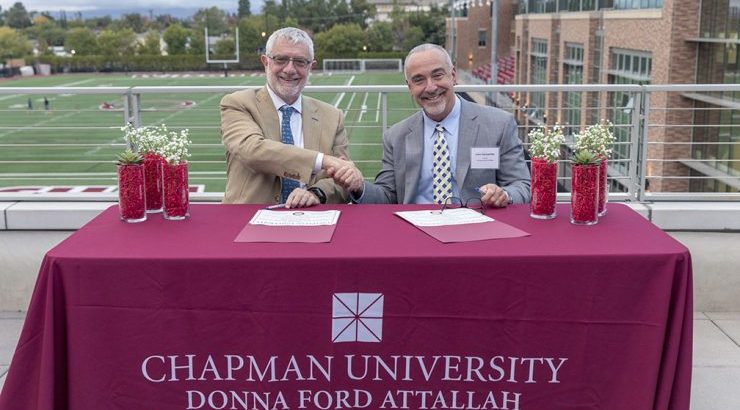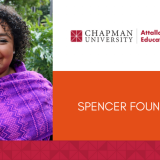
Future Educators Partnership Signed with Local Community Colleges
December 12, 2019
New local community college partnerships will bring future educators to Chapman and help fill the growing need for qualified teachers in Orange County.
Chapman University’s Attallah College of Educational Studies has signed new partnerships with both Santa Ana College (SAC) and Santiago Canyon College (SCC) that are designed to meet the growing need for teachers in California.
The Chapman Transfer Admission Guarantee (C-TAG) for Future Educators is a new pathway for community college students who want to become elementary or special education teachers in their communities. Under the agreement, students who complete a prerequisite program at SAC or SCC will be offered guaranteed transfer admission to Chapman University, where they will complete their bachelor’s degree in Attallah College’s Integrated Educational Studies (IES) program.
“The C-TAG for Future Educators is the first agreement of its kind focused on future teachers that is especially geared toward those seeking to serve our children and our community here in Orange County,” said Margaret Grogan, Dean of Attallah College, at the SCC signing event on December 4, 2019.
Santiago Canyon College President John Hernandez welcomed the new pathway to teaching partnership, saying, “Streamlining the transfer pipeline, demystifying what that’s like, particularly for first generation college students, is extremely critical and important.”
Scholarships for Future Educators
Along with the partnership, Chapman University President Daniele Struppa announced that 10 two-year, full tuition scholarships will be available to SAC and SCC students who enter Chapman as part of the first cohort in the C-TAG Future Educators program in fall 2021.
The scholarships will open doors for students in underserved areas, many of whom might not otherwise have access to a four-year education.
Building a Stronger Community
Across the nation, school districts are facing a growing teacher shortage. In California alone, it’s projected that 100,000 new teachers will be needed over the next decade, particularly Special Education and STEM teachers. In schools that serve lower-income neighborhoods, English language learners, and racially and ethnically diverse communities — districts that are more likely to depend on teachers with emergency or substandard credentials — the situation is even more dire.
By partnering with community colleges, Chapman hopes to increase the pool of well-qualified teachers to serve these communities.
“At Chapman, we strive to build connections and enhance the relationships necessary to identify solutions to both global and local concerns,” said President Struppa. “These new partnerships are key to strengthening our surrounding community.”
A Model for Future Partnerships
“This transfer agreement is not like other transfer agreements that we have,” said President Hernandez, who is himself a first-generation college student. “It really has elements and components that go way beyond articulation and guaranteed transfer. It has opportunities for students to be in a cohort model, to have a shared course at SCC… to have increased contact with Chapman faculty and staff before they’re even here.”
Roxy Lopez ’19, who began her education at SCC before transferring to Chapman and is now working to complete her master’s degree in special education, agrees that the community and support provided by the C-TAG will help ensure student success. “I’m excited for the future students who will have that sense of community,” she said, “to come together into Chapman and graduate together. I’m extremely excited for the SCC students to know what Chapman is all about, especially IES.”
Attallah College’s IES program offers a unique approach to educational studies that looks beyond the classroom to embrace the whole community. Students engage with faculty research, carry out fieldwork, and learn and develop methodologies that will allow them to bring “the classroom of the future” back to their own communities.
“Educating the next generation requires a real team effort,” said Dean Grogan. “Having critically important connections to community colleges expands our capacity to draw on local knowledge and expertise. We have the same aims to make Orange County a lively center of learning, where individuals have the opportunity to thrive socially, emotionally, and academically.”
Visit the C-TAG for Future Educators webpage for more details about program eligibility and requirements.

